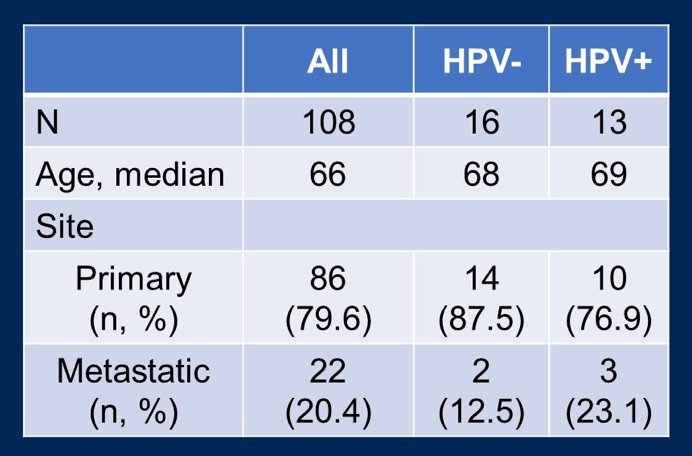(UroToday.com) The 2022 GU ASCO Annual meeting included a rare tumors session featuring work from Dr. Bassel Nazha and colleagues presenting results assessing the comprehensive genomic profiling of penile squamous cell carcinoma (SCC) and the impact of HPV status on immune-checkpoint inhibition-related biomarkers. Penile SCC is a rare and aggressive malignancy with few treatments in the advanced setting and little success of immune-checkpoint inhibitions (ICI). More effective and less toxic treatment are needed. Notably, approximately half of penile SCC cases are linked to HPV infection. This study aimed to report the landscape of somatic alterations and ICI-related biomarkers in penile SCC in the Caris Life Sciences dataset and to establish signatures for HPV-dependent and HPV-independent oncogenesis.
Penile SCC tumors were analyzed using next-generation sequencing of DNA (TruSeq, 45 genes; NextSeq, 592 genes and NovaSeq, whole exome sequencing) and RNA (NovaSeq). PD-L1 expression was tested by IHC using SP142, and microsatellite instability (MSI) was tested by fragment analysis, IHC and NGS. Tumor mutational burden was measured by counting all somatic mutations found per tumor (tumor mutational burden -high: >10 mutations per MB). HPV16/18 status was determined using whole exome sequencing, when available. Significance was determined using chi-square and Wilcoxon rank sum test and adjusted for multiple comparisons (q-value <0.05).
Among the entire cohort (N=108), the median age was 66 years and 79.6% of tumors were primary and 20.4% of tumors were metastatic. A summary of the baseline characteristics is as follows:

In the overall cohort, the most frequently detected mutations were TP53 (46%), CKDN2A (26%), PIK3CA (25%), TERT promoter (22%), KMT2C (16%) and NOTCH1 (14%), consistent with previous reports. A full listing of the pathogenic mutations by NGS-592 and whole exome sequencing:

Overall, 51% of tumors were PD-L1+ (SP142, >1%), 10.7% had high tumor mutational burden, and 1.1% had dMMR/MSI-H. Of the 108 tumors, 29 had HPV status tested by whole exome sequencing (HPV16/18+, n=13 and HPV16/18-, n=16). KMT2C mutations (33% vs 0%) and FGF3 amplifications (30.8% vs 0%) were specific to HPV16/18+ tumors, while CDKN2A mutations (37.5% vs 0%) were exclusive to HPV16/18- tumors. HPV16/18+ tumors also had a trend towards decreased TP53 (7.7% vs 63%) and TERT promoter (25% vs 77%) alterations:

Tumor mutational burden-high were exclusively found in the HPV16/18+ group (30.8% vs 0%), while PD-L1 and dMMR/MSI-H status were comparable between the two groups.
Dr. Nazha concluded this presentation of the comprehensive genomic profiling of penile SCC and the impact of HPV status on immune-checkpoint inhibition-related biomarkers with the following concluding statements:
- This comprehensive NGS study of penile SCC somatic alterations is the largest to date
- HPV16/18+ vs HPV16/18- penile SCC were molecularly distinct tumors, consistent with previous reports. Ongoing trials for HPV+ SCC include penile SCC patients (ie. HPV therapeutic vaccine NCT03439085)
- The finding that tumor mutational burden-high was exclusive to patients with HPV16/18+ tumors requires confirmation in larger datasets and could be used for better patient stratification in ICI clinical trials
- Low prevalence of penile SCC continues to be an obstacle for dedicated prospective trials, thus multicenter collaborations and large datasets are needed
- Genomic data should be used for enrollment in umbrella or basket trials looking at immune checkpoint inhibitor combinations or targeted therapies for penile SCC
Presented By: Bassel Nazha, MD, MPH, Emory University Department of Hematology and Medical Oncology, Atlanta, GA
Co-Authors: Sharon Wu, Jacqueline T Brown, Daniel Magee, Bradley Curtis Carthon, Omer Kucuk, W. Michael Korn, Pedro C. Barata, Elisabeth I. Heath, Charles J. Ryan, Rana R. McKay, Viraj A. Master, Mehmet Asim Bilen
Affiliations: Caris Life Sciences, Phoenix, AZ, Department of Hematology and Medical Oncology, Emory University School of Medicine, Atlanta, GA, Emory University Hospital Midtown, Atlanta, GA, Winship Cancer Institute of Emory University, Atlanta, GA, Tulane University Medical School, New Orleans, LA, Karmanos Cancer Institute, Department of Oncology, Wayne State University School of Medicine, Detroit, MI, Division of Hematology, Oncology and Transplantation, Department of Medicine, University of Minnesota, Minneapolis, MN, University of California San Diego, La Jolla, CA
Written By: Zachary Klaassen, MD, MSc – Urologic Oncologist, Assistant Professor of Urology, Georgia Cancer Center, Augusta University/Medical College of Georgia, @zklaassen_md on Twitter during the 2022 American Society of Clinical Oncology Genitourinary (ASCO GU) Cancers Symposium, Thursday Feb 17 – Saturday Feb 19, 2022


